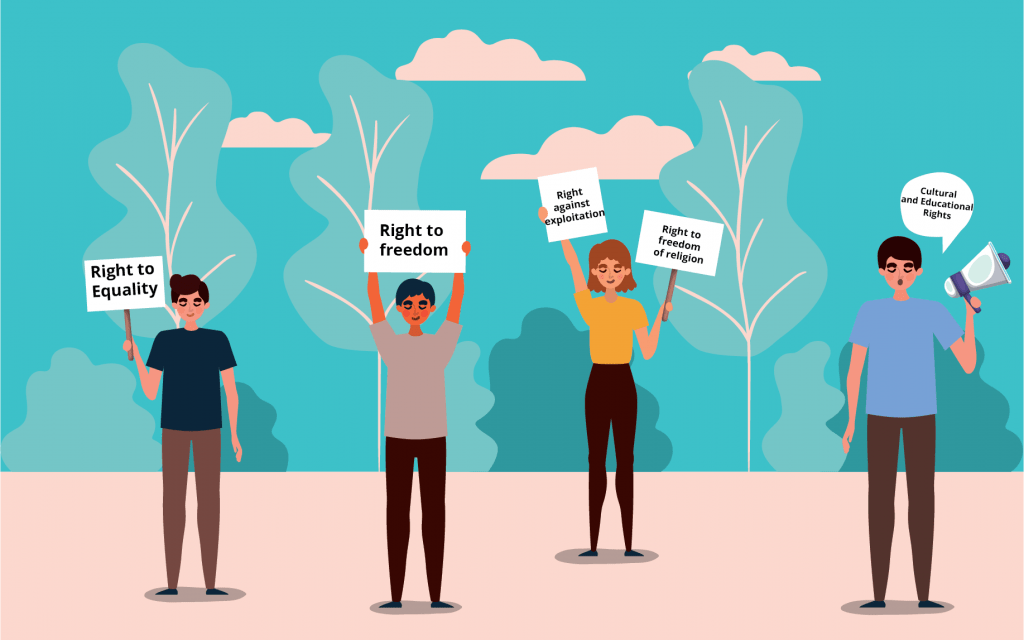
What’s Up With This Insistence On Fundamental Duties?
Author – Waseem Ahmad
There is a certain buzz about fundamental duties these days. I heard from many people, including university professors, students, and members of the political establishment, that people should perform fundamental duties and then only ask for fundamental rights.
Even before a person starts to talk about violation of the fundamental rights in the country today, they are swiftly slapped with the question that why do people only seek rights and do not perform their duties? The New Education Policy also highlights that the fundamental duties will be an important theme of the curriculum.
Who is proposing this idea and why?
If one observes the profile of the people espousing this idea, it is evident that most people from dominant caste backgrounds and economically well-off classes are cosy with this idea.
It must be highlighted that this reasoning that ‘duties come first’ may seem pertinent to a layperson. But it needs to be understood that this reasoning is flawed at many levels and is deliberately being planted among the people with vested interests in the present political establishment.
One of the most important reasons for the furthering of this idea is to delegitimize the human rights campaigns in the country. By saying that Indians do not perform their duties to the State, the people are stripped of their question to seek the fundamental right to life and liberty in the country.
The well-off sections of our society, including dominant caste and upper/middle-class people, have peaceful and successful interactions with the State machinery like police and judiciary. The state respects them and seldom treats them uncomfortably. This makes them myopic to the broader issue of injustices faced by less fortunate populations of this country.
The people espousing the ‘duties first and rights later’ scheme must understand that the Indian State does not treat all its citizens equally. The machinery of the state is awfully favourable towards the privileged and wealthy; while dealing mercilessly with the poor and downtrodden.
In India, the people from poor, oppressed, and marginalized backgrounds are more likely to face police brutality or difficulty in access to justice. This is the reason why the large majority of the oppressed people who are being denied their fundamental rights have to agitate and show their discomfort at the apathy of the State.
This triggers a sense of alarm in the ‘safer’ populations whose rights are respected by the State and its machinery. And hence these sorts of anti-rights campaigns find legitimacy in the public square.
This thinking has also to do with the mindset of the dominant caste people who believe, consciously or unconsciously, that ‘they’ only have the privileges from the State and other poor and oppressed groups must not try to seek similar rights as them.
Constitution and Fundamental Duties
This idea is flawed according to the constitution also. The makers of the constitution added fundamental rights as the most important part of this document. They did not consider anything like fundamental duties. Fundamental rights are mandatory and enforceable by the courts while fundamental duties are optional and a citizen cannot be forced to comply.
Fundamental duties were added to the constitution by Indira Gandhi. She used this ‘duties’ concept to evade her responsibility for the safety of the citizens and to proceed with her authoritarian emergency.
It is the characteristic of an authoritarian regime to seek unquestioned loyalty and performance of said duties while perpetrating violation of their most basic rights like freedom of speech and expression as well as freedom of life and liberty. A similar time or much worse is here and again the establishment is asking people not to care about rights, but to meekly follow the decree of the State.
These entitled individuals must know that the present concept of Nation-State is based on a social contract between the State and the People where people have created the State to facilitate their affairs. The State does not have any superiority over the will of people and hence it cannot claim any duties as such.
The fundamental rights are not the charity of the Indian state to its citizens but their earned rights and they must have it.
It is not that these people from dominant castes and upper/middle-classes care about the fundamental duties to the country, but it is about their disdain for the common people generally and particularly oppressed and marginalized communities seeking similar rights. They cannot tolerate the fact that everyone in this country can have similar rights and privileges as themselves.
– Waseem Ahmad studies Social Work at the University of Delhi.



+ There are no comments
Add yours